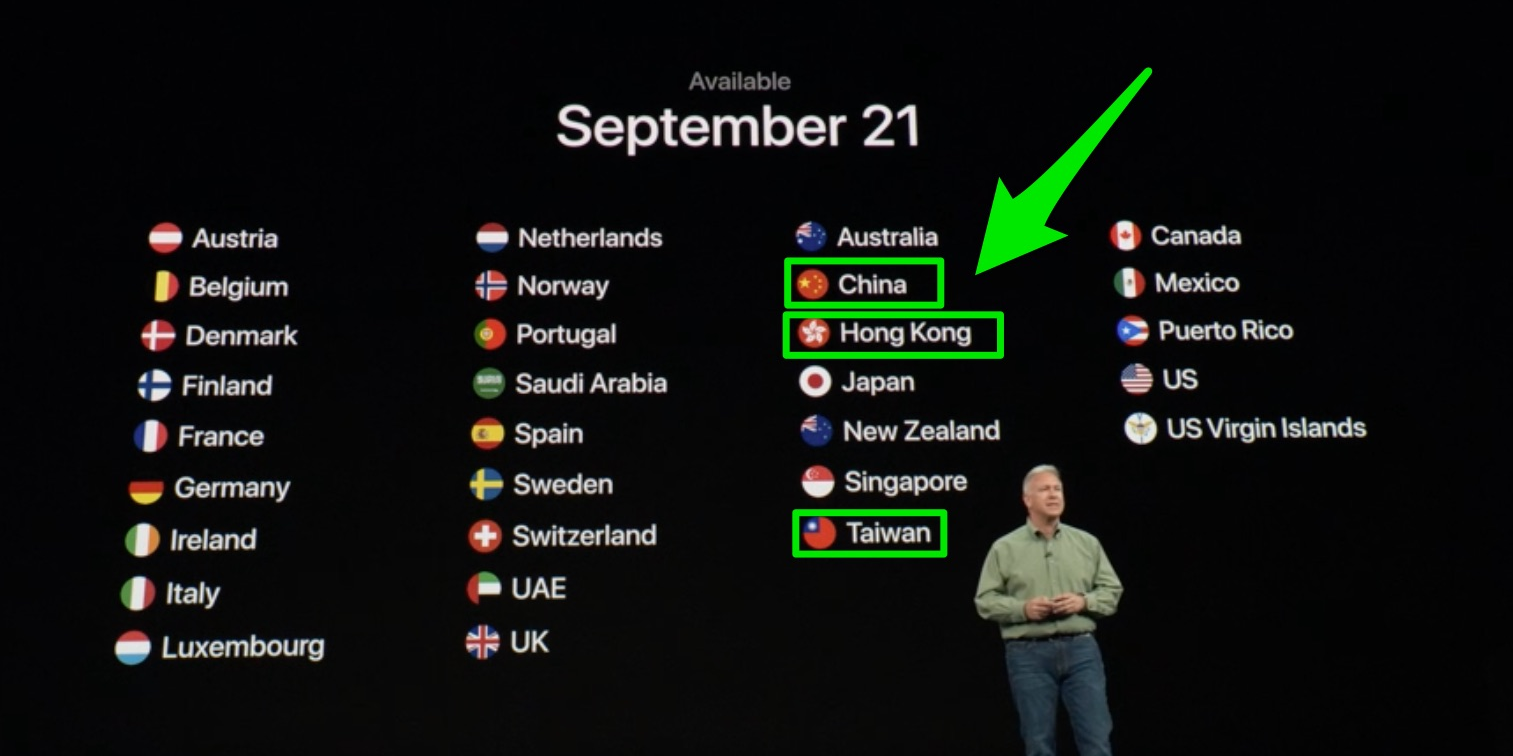- On Wednesday during its annual iPhone event, Apple mentioned Taiwan and Hong Kong without using China’s preferred terms.
- Chinese state media and citizens lashed out at the tech giant for not acknowledging Chinese sovereignty over those two places.
- The state-run China Central Television suggested that Apple could lose its market demand in China and that its actions could “cause unnecessary political and legal troubles.”
- Taiwan for decades has operated as its own country, but Beijing insists that Taiwan belongs to it.
- Hong Kong is a special administrative region that belongs to China.
- Apple has a lot to lose from alienating China.
China is lashing out at Apple after the tech giant failed to use Beijing’s preferred name for Taiwan during the company’s annual iPhone event on Wednesday.
While introducing where its new iPhone XS and iPhone XS Max devices would be available later this month, Apple listed China, Hong Kong, and Taiwan separately alongside the three nations’ flags.
Multiple news outlets run by the Chinese state have since published posts demanding explanations from Apple, with China Central Television suggesting that Apple’s actions could “hurt” its market demand in China and “cause unnecessary legal and political troubles.”

"People with a little bit of common sense will list 'Hong Kong, China,' and 'Taiwan, China,' on official occasions," China Central Television wrote on Thursday. "How can such a serious and professional occasion like the Apple keynote not do this?"
It added: "A company known for its rigor and service excellence must be very sophisticated in every detail. Details about a country's territorial sovereignty must go through rigorous verification before they can be released to the public.
"If this kind of sloppiness is allowed to continue, it will not only hurt the company's reputation and market demand but also cause unnecessary political and legal troubles."
The broadcaster noted that while Apple listed the US Virgin Islands separately from the US, the company made clear the US's sovereignty over the region.
US Virgin Islands, however, is the official name of the US-administered island chain, used to differentiate it from the British Virgin Islands.
Additionally, Apple listed Puerto Rico, a US territory, without describing it as belonging to the US.

Still, the state-run Beijing Daily wrote on the popular microblogging site Weibo: "How difficult is it to add a 'China' in front of 'Taiwan'?"
The state-run tabloid Global Times added: "Apple, what do you mean by this?"
Apple's official Weibo page was also flooded with comments demanding explanations and saying the company was "ill."
Other commentators on Weibo accused Apple of disrespecting China and threatened to return all their Apple products.

Apple has a lot to lose in China
Apple has a lot to lose if China Central Television's threats become a reality. China is one of Apple's largest markets and is home to its main production base.
Chinese consumers are also starting to prefer domestic tech brands, like Huawei, over Apple, Bloomberg reported this week.
Apple has accommodated China before, earlier this year deleting thousands of gambling apps in China after the country's state media targeted the firm for encouraging gambling, which is banned in mainland China.
Last year, Apple also removed hundreds of virtual-private-network apps, which helped users bypass China's so-called Great Firewall and let them access foreign media, which is also banned in China.
Shawn Zhang, a law student who is an expert in human rights in China, tweeted immediately after Apple's event that he thought the company would "soon issue an apology for hurting the feelings of Chinese people." The ruling Chinese Communist Party regularly says references to Taiwan that do not acknowledge China's claim of ownership hurt the feelings of Chinese citizens.
Business Insider has contacted Apple for comment.

Taiwan and Hong Kong are a sore subject for China
Taiwan, also known as the Republic of China, describes itself as an independent nation and has for decades maintained diplomatic relations with other countries without China's involvement.
China, on the other hand, claims that Taiwan belongs to it.
Hong Kong is a special administrative region of China, which means it belongs to China but operates under a different government and separate legal system.
Earlier this year China pressured dozens of international airlines and companies to stop referring to Taiwan as a separate country on their flight listings. Many have complied.
The White House in May stood up for US companies' right to recognize or ignore China's claim to Taiwan by calling China's pressure campaign "Orwellian nonsense and part of a growing trend by the Chinese Communist Party to impose its political views on American citizens and private companies."
Multiple countries also cut diplomatic ties with Taiwan in recent months, which Taiwan has blamed on China. The latest break came last month when El Salvador broke diplomatic ties with Taiwan, leaving the island nation with just 17 allies.
Taipei has blamed the trend on China's "dollar diplomacy" - using foreign aid and investment to pressure economic allies to cut ties.

